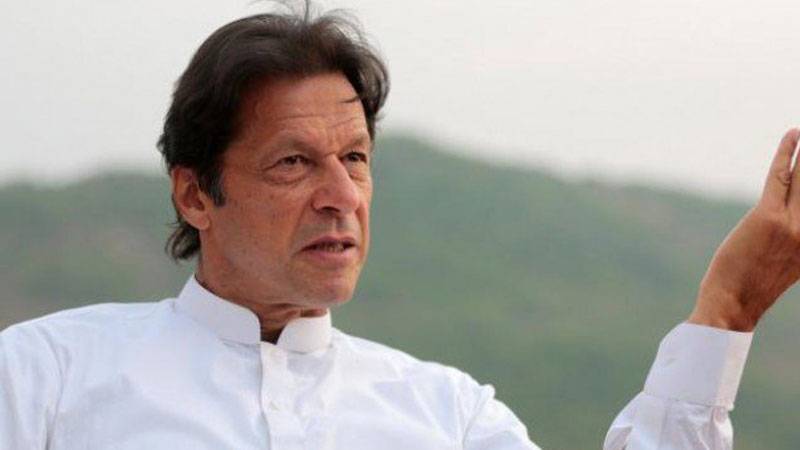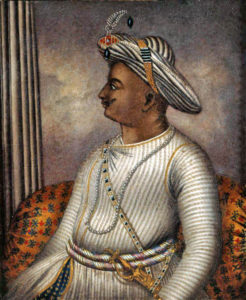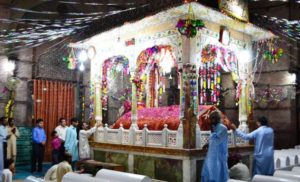
Iftikhar Alam questions Prime minister Imran Khan's use of historical references and why they are problematic for the country's future
Prime Minister Imran Khan appeared on the floor of National Assembly on February 28 to announce release of Indian pilot Abhinandan. In his speech, PM Khan declared Tipu Sultan a national hero and Bahadur Shah Zafar a villain.
He made a statement against the last Mughal king from the country’s highest official platform and ended up misquoting history.

But this was not the first time he distorted historical facts.
Khan also made a reference to our national history on December 14, 2018, when he tweeted a four minutes and 40 seconds video clip of pan-Islamist Dr Israr Ahmad to explain Quaid-e-Azam Muhammad Ali Jinnah’s vision about Pakistan.
“Naya [New] Pakistan Vision is actually the vision of our great leader Quaid-e-Azam Muhammad Ali Jinnah,” read the caption of the video.
A strong proponent of ‘Islamic world order’, Dr Israr, tells people in the video how Jinnah longed for the same.
Khan’s tweet put in shock many of his followers who watched him along with his wife Bushra Bibi kissing the floor of the shrine of Sufi saint Faridudin Chishti during his election campaign in June 2018. Then, thousands appeared to appreciate his reverence for the Sufi saint but many dubbed his act as 'unIslamic'. After winning the election and becoming the prime minister, Khan chose the latter’s path. And he took few months to cover his journey from Baba Farid to Dr Israr and perhaps it was his most dangerous U-Turn.
Senior journalist Raza Rumi rightly took notice of the PM tweet and tweeted: “Citing Dr Israr Ahmad to understand Jinnah simply proves my thesis that the current historical moment is the culmination of nationalism project redefined during 1980s; and which has influenced an entire generation that has grown up believing everything Pakistan Studies teaches.”
But, can Pakistan afford this change of heart and can we continue to believe what Pakistan Studies teaches our children? And can we afford Pakistan becoming a theocratic state as wished by the likes of Dr Israr? Or should PM Khan seek guidance from the teachings of Sufi saints like Baba Farid to transform Pakistan into welfare state based on the secular and moderate values?
Isn’t it about time we informed the youth that the founder of Pakistan was the only Muslim politician who had opposed the Khilafat Movement (1919-1924) and his party Muslim League had accepted the Cabinet Mission’s plan of 1946 which had proposed united confederal India? His famous address to Pakistan’s first constituent assembly should not be the part of curriculum?

The Clash of Ignorance
Samuel Phillips Huntington (1927-2008), a US political scientist, came with his theory “The Clash of Civilizations" and within days of its publication in 1993, it became a ‘most beloved reference’ of Islamist organizations and their so-called leaders to propagate their own ‘theory’ among his followers.
Khan is requested to seek guidance from great Arab-American scholar Edward Said (1935-2003) who had declared the Samuel’s theory as “The Clash of Ignorance.”
Few years later, Benazir Bhutto appeared with another brilliant solution in her book entitled Reconciliation: Islam, democracy, and the West. This book proposed a way forward to co-existence and true reflection Jinnah’s vision towards Pakistan.
(I remember how Jamaat-e-Islami rushed to condemn her book, which she wrote few months before her assassination in 2007, in its official publication Tarjman ul Quran weeks after its publication in 2008.)
If Khan is willing to transform Pakistan as per vision of Islamist organizations, then he should stop his rhetoric for peace with India and officially declare war against non-Muslims who are not ready to surrender before Islam.
Fariduddin Masud (1179-1266) aka Baba Farid born at a village called Kothewal, 10 km from Multan and died in Pakpattan where PM Khan appeared during the election campaign and sought the saint’s blessings. A proponent of message of love, peace and co-existence among religions, Baba Farid’s poetry is part of Sikhism religious text Guru Granth Sahib Ji.
(The other Muslim Sufi whose hymns are included in Granth is Bhagat Bhikhan (1480-1573) who was born at Kakori near Lucknow in present-day Uttar Pradesh state in India.)
Bahadur Shah Zafar was a rallying point for anti-colonial struggle
Prime Minister Imran Khan’s criticism on Zafar and the comparison of the Mughal king with Tipu Sultan demonstrate that he was not only misinformed or misled about Jinnah’s vision, he has equally flawed understanding about Indian history.
Tipu, (1750-1799), a young dynamic ruler (1782-1799) of Mysore, is indeed a hero of this region (except from the followers of Hindutva) but Zafar (1775-1862) is not villain of this nation.
Comparison between an octogenarian, dying king who had nothing in his hands with a ruler who inherited a strong army from his father is rather unjustified.
But, still we cannot deny that Zafar was the rallying point for the failed Indian uprising of 1857 against the British East India Company.
Khan must know that the Mughal Empire had lost much of its influence and territory by the end of the 1700s. Zafar came to the throne in 1837, aged 63, and his rule extended only to Delhi and its surroundings. His coronation took place after his father Akbar Shah II’s 31 years (1806-1837) service as a titular figurehead under British protection. Zafar, at time of mutiny, was 82 and died after arrest at age of 87 in November 1862 in Yangon Burma.
Mughal rule started over India in 1526 and till 1707 (181 years) it was led by six kings (Babur, Hamayun, Jahangir, Shah Jahan and Alamgir).
But from 1707 to 1857 (150 years), we have a long list of Bahadar Shah I, Jahandar Shah, Farrukhsayar, Rafiud Darajat, Shah Jahan II, Muhammad Shah, Ahmad Shah Bahadur, Alimgir II, Shah Jahan III, Shah Alam II, Muhammad Shah Bahdur, Akbar Shah II and then Bahadur Shah II.
One can safely say that Mughal kings replacements took place with the same speed from 1707 to 1857 as of the prime ministers in Pakistan.
Prime Minister Imran Khan appeared on the floor of National Assembly on February 28 to announce release of Indian pilot Abhinandan. In his speech, PM Khan declared Tipu Sultan a national hero and Bahadur Shah Zafar a villain.
He made a statement against the last Mughal king from the country’s highest official platform and ended up misquoting history.

But this was not the first time he distorted historical facts.
Khan also made a reference to our national history on December 14, 2018, when he tweeted a four minutes and 40 seconds video clip of pan-Islamist Dr Israr Ahmad to explain Quaid-e-Azam Muhammad Ali Jinnah’s vision about Pakistan.
“Naya [New] Pakistan Vision is actually the vision of our great leader Quaid-e-Azam Muhammad Ali Jinnah,” read the caption of the video.
A strong proponent of ‘Islamic world order’, Dr Israr, tells people in the video how Jinnah longed for the same.
Khan’s tweet put in shock many of his followers who watched him along with his wife Bushra Bibi kissing the floor of the shrine of Sufi saint Faridudin Chishti during his election campaign in June 2018. Then, thousands appeared to appreciate his reverence for the Sufi saint but many dubbed his act as 'unIslamic'. After winning the election and becoming the prime minister, Khan chose the latter’s path. And he took few months to cover his journey from Baba Farid to Dr Israr and perhaps it was his most dangerous U-Turn.
Senior journalist Raza Rumi rightly took notice of the PM tweet and tweeted: “Citing Dr Israr Ahmad to understand Jinnah simply proves my thesis that the current historical moment is the culmination of nationalism project redefined during 1980s; and which has influenced an entire generation that has grown up believing everything Pakistan Studies teaches.”
But, can Pakistan afford this change of heart and can we continue to believe what Pakistan Studies teaches our children? And can we afford Pakistan becoming a theocratic state as wished by the likes of Dr Israr? Or should PM Khan seek guidance from the teachings of Sufi saints like Baba Farid to transform Pakistan into welfare state based on the secular and moderate values?
Isn’t it about time we informed the youth that the founder of Pakistan was the only Muslim politician who had opposed the Khilafat Movement (1919-1924) and his party Muslim League had accepted the Cabinet Mission’s plan of 1946 which had proposed united confederal India? His famous address to Pakistan’s first constituent assembly should not be the part of curriculum?

The Clash of Ignorance
Samuel Phillips Huntington (1927-2008), a US political scientist, came with his theory “The Clash of Civilizations" and within days of its publication in 1993, it became a ‘most beloved reference’ of Islamist organizations and their so-called leaders to propagate their own ‘theory’ among his followers.
Khan is requested to seek guidance from great Arab-American scholar Edward Said (1935-2003) who had declared the Samuel’s theory as “The Clash of Ignorance.”
Few years later, Benazir Bhutto appeared with another brilliant solution in her book entitled Reconciliation: Islam, democracy, and the West. This book proposed a way forward to co-existence and true reflection Jinnah’s vision towards Pakistan.
(I remember how Jamaat-e-Islami rushed to condemn her book, which she wrote few months before her assassination in 2007, in its official publication Tarjman ul Quran weeks after its publication in 2008.)
If Khan is willing to transform Pakistan as per vision of Islamist organizations, then he should stop his rhetoric for peace with India and officially declare war against non-Muslims who are not ready to surrender before Islam.
Fariduddin Masud (1179-1266) aka Baba Farid born at a village called Kothewal, 10 km from Multan and died in Pakpattan where PM Khan appeared during the election campaign and sought the saint’s blessings. A proponent of message of love, peace and co-existence among religions, Baba Farid’s poetry is part of Sikhism religious text Guru Granth Sahib Ji.
(The other Muslim Sufi whose hymns are included in Granth is Bhagat Bhikhan (1480-1573) who was born at Kakori near Lucknow in present-day Uttar Pradesh state in India.)
Bahadur Shah Zafar was a rallying point for anti-colonial struggle
Prime Minister Imran Khan’s criticism on Zafar and the comparison of the Mughal king with Tipu Sultan demonstrate that he was not only misinformed or misled about Jinnah’s vision, he has equally flawed understanding about Indian history.
Tipu, (1750-1799), a young dynamic ruler (1782-1799) of Mysore, is indeed a hero of this region (except from the followers of Hindutva) but Zafar (1775-1862) is not villain of this nation.
Comparison between an octogenarian, dying king who had nothing in his hands with a ruler who inherited a strong army from his father is rather unjustified.
But, still we cannot deny that Zafar was the rallying point for the failed Indian uprising of 1857 against the British East India Company.
Khan must know that the Mughal Empire had lost much of its influence and territory by the end of the 1700s. Zafar came to the throne in 1837, aged 63, and his rule extended only to Delhi and its surroundings. His coronation took place after his father Akbar Shah II’s 31 years (1806-1837) service as a titular figurehead under British protection. Zafar, at time of mutiny, was 82 and died after arrest at age of 87 in November 1862 in Yangon Burma.
Mughal rule started over India in 1526 and till 1707 (181 years) it was led by six kings (Babur, Hamayun, Jahangir, Shah Jahan and Alamgir).
But from 1707 to 1857 (150 years), we have a long list of Bahadar Shah I, Jahandar Shah, Farrukhsayar, Rafiud Darajat, Shah Jahan II, Muhammad Shah, Ahmad Shah Bahadur, Alimgir II, Shah Jahan III, Shah Alam II, Muhammad Shah Bahdur, Akbar Shah II and then Bahadur Shah II.
One can safely say that Mughal kings replacements took place with the same speed from 1707 to 1857 as of the prime ministers in Pakistan.
